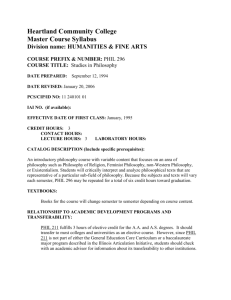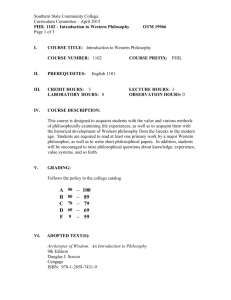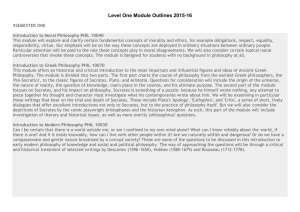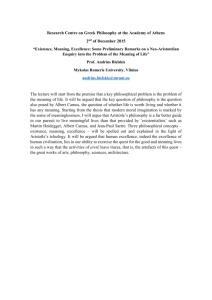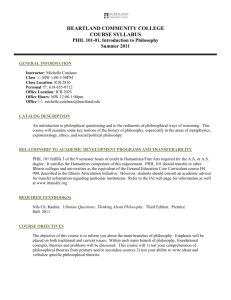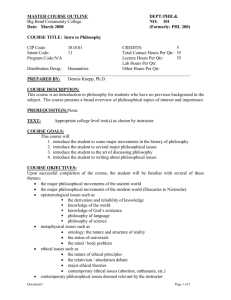University College Dublin
advertisement
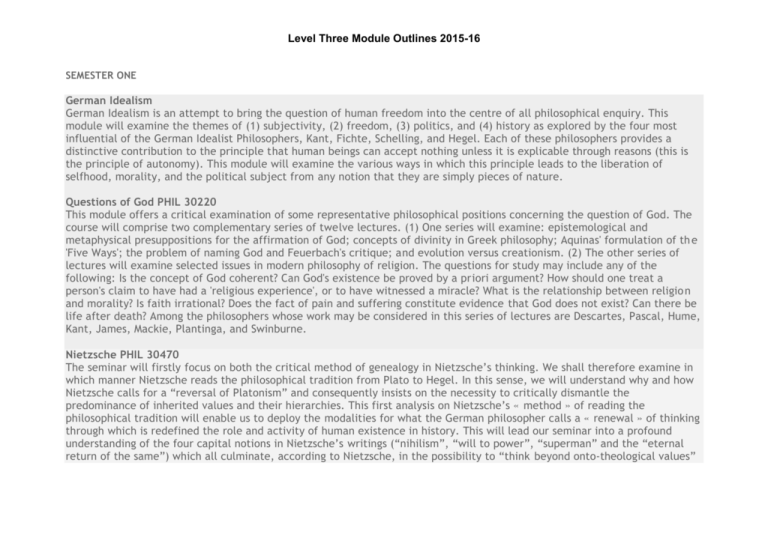
Level Three Module Outlines 2015-16 SEMESTER ONE German Idealism German Idealism is an attempt to bring the question of human freedom into the centre of all philosophical enquiry. This module will examine the themes of (1) subjectivity, (2) freedom, (3) politics, and (4) history as explored by the four most influential of the German Idealist Philosophers, Kant, Fichte, Schelling, and Hegel. Each of these philosophers provides a distinctive contribution to the principle that human beings can accept nothing unless it is explicable through reasons (this is the principle of autonomy). This module will examine the various ways in which this principle leads to the liberation of selfhood, morality, and the political subject from any notion that they are simply pieces of nature. Questions of God PHIL 30220 This module offers a critical examination of some representative philosophical positions concerning the question of God. The course will comprise two complementary series of twelve lectures. (1) One series will examine: epistemological and metaphysical presuppositions for the affirmation of God; concepts of divinity in Greek philosophy; Aquinas' formulation of th e 'Five Ways'; the problem of naming God and Feuerbach's critique; and evolution versus creationism. (2) The other series of lectures will examine selected issues in modern philosophy of religion. The questions for study may include any of the following: Is the concept of God coherent? Can God's existence be proved by a priori argument? How should one treat a person's claim to have had a 'religious experience', or to have witnessed a miracle? What is the relationship between religio n and morality? Is faith irrational? Does the fact of pain and suffering constitute evidence that God does not exist? Can there be life after death? Among the philosophers whose work may be considered in this series of lectures are Descartes, Pascal, Hume, Kant, James, Mackie, Plantinga, and Swinburne. Nietzsche PHIL 30470 The seminar will firstly focus on both the critical method of genealogy in Nietzsche’s thinking. We shall therefore examine in which manner Nietzsche reads the philosophical tradition from Plato to Hegel. In this sense, we will understand why and how Nietzsche calls for a “reversal of Platonism” and consequently insists on the necessity to critically dismantle the predominance of inherited values and their hierarchies. This first analysis on Nietzsche’s « method » of reading the philosophical tradition will enable us to deploy the modalities for what the German philosopher calls a « renewal » of thinking through which is redefined the role and activity of human existence in history. This will lead our seminar into a profound understanding of the four capital notions in Nietzsche’s writings (“nihilism”, “will to power”, “superman” and the “eternal return of the same”) which all culminate, according to Nietzsche, in the possibility to “think beyond onto-theological values” Level Three Module Outlines 2014-15 and thus towards the “force” of a “justice” for thinking which remains irreducible and thus dissociated from the traditional significance and “economy” of “truth”. Anarchy, Law & the State PHIL 30230 This module will consider a central topic in political philosophy - the nature, function and justification of the State - from a libertarian perspective. A considerable amount of reading material will be made available to students via Blackboard and this material will contextualise the discussions. Murray Rothbard's The Ethics of Liberty (available on blackboard) is the core tex t for the module. Also worth consideration is Harold Berman's Law and Revolution and Gerard Casey's Libertarian Anarchism (published July 2012). The Philosophies of Wittgenstein PHIL 30430 Ludwig Wittgenstein (1889—1951) is one of the most significant and influential philosophers of recent times. Indeed, Wittgenstein's unique philosophical approach and distinctive style of writing have made him a cult-like figure in wider intellectual and artistic circles, beyond that of philosophy, and have been a source of inspiration for film -makers, painters and composers alike. Wittgenstein is also unusual because of at least two, some would say t hree, radical changes in his philosophical thinking and approach. The present course covers key aspects of both the early and later Wittgenstein. The module is co-taught by several members of staff from the School of Philosophy with expertise in different aspects of Wittgenstein's work. The first section focuses on the early Wittgenstein and his masterpiece, the Tractatus Logico Philosophicus. In the second section we look at his most significant work, the Philosophical Investigations. We complete the course with an examination of Wittgenstein's last work, On Certainty. Medieval Philosophy PHIL 30290 This course offers an historical and critical introduction to the late classical and medieval philosophical traditions in the West, from the late Greek period through to the Renaissance. Selected classical texts influential on the medieval tradition, e.g. works by Plato, Aristotle and post-Aristotelian philosophers, will be examined. The course will then focus on selected readings from some of the following medieval philosophers (including Christian, Islamic and Jewish traditions): Augustine of Hippo, Boethius, Johannes Scottus Eriugena, Anselm, Averroes, Avicenna, Maimonides, Aquinas, Meister Eckhart, Nicholas of Cusa. Topics may include, among others: faith and reason, the existence of God, the nature of soul and intellect, the structure of being, and the nature of the good. Prudence and Passion: Aesthetics in the 18th Century PHIL 30460 Level Three Module Outlines 2014-15 Prudence and Passion: Aesthetics in the Age of Reason This module provides an introduction to aesthetic philosophy before Kant. In examining seventeenth and eighteenth century aesthetic philosophy we come to understand not only the principle philosophical features of the age of Enlightenment but the pull of the ‘Counter Enlightenment’ as described by Isaiah Berlin. The touchstone for our discussion of aesthetics will be the art of poetry: poetry as practice for understanding and transforming the world; appreciation of poetry and objections to poetry. We begin with Sir Philip Sidney’s Aristotelian Apology for Poetry and a survey of Francis Bacon’s argument for an Ars Inveniendi, that is for an art of invention or discovery of truth. From this introduction to Bacon’s early modern epistemological project we will develop the themes that will guide our investigation throughout the rest of the module: (i) the debate between the virtues of ‘imitation’ versus ‘invention’; (ii) the elaboration of the connection between the arts and sciences; (iii) the problem of apprehending reality and engaging in transformation; (iv) the relevance of the practice of art or the appreciation of art to the development of morals. We will read excerpts from Swift’s Tale of a Tub, and Gulliver’s Travels; excerpts from John Locke’s Concerning Human Understanding that discuss poetry; David Hume’s Of the Standard of Taste and Edmund Burke’s Philosophical Enquiry into the Origin of Our Ideas on the Sublime and Beautiful Level Three Module Outlines 2014-15 SEMESTER TWO Philosophy of Mind PHIL 30030 What is the nature of the mind? How is the mind related to the body? Those are the two most central questions in the philosophy of mind. This course will provide an introduction to the main topics, theories, and arguments in this field. In the first part, we will address the mind-body problem. We will look at traditional answers, ranging from dualism to materialism, and at more recent views, such as functionalism, the computational theory of mind, and connectionism. In the second part, we will focus on questions concerning the nature of consciousness and intentionality (or 'aboutness'). The main question will be whether or not consciousness and intentionality can ever be explained or 'naturalized'. In the final part, we will address some selected further issues that have been discussed in the more recent debate. They include social cognition, the nature of the emotions, and embodied cognition. Philosophy of Language PHIL 30070 This module explores philosophical questions regarding language and meaning and their application to social and political contexts. The course falls into two sections. In Part 1, we look at a number contemporary theories of meaning as a response to questions such as ‘What is linguistic meaning?’ ‘what are the conditions of meaningfulness?, ‘what does it take to understand a word or a sentences?’ , 'what are the connections between language, thought and action?", and ‘what do the words we use and understand pick out?’. Part 2 of the course builds on the discussions of Part 1 in order to shed light on what I call ‘language in extremis’, i.e. the use we make of language to insult, agitate, brainwash, shame, pervert, etc. Topics covered in this second part of the course will include hate speech, racial slurs, pornography, linguistic stereotyping, propaganda, and language as a political tool. Introductory and background Reading Lycan, William G, Philosophy of Language, London: Routledge; 2000 Miller, Alexander, Philosophy of Language, London: Routledge; 1998 Michael Morris, An Introduction to the Philosophy of Language. Cambridge University Press. 2007. Stanford Encyclopedia of Philosophy http://plato.stanford.edu/contents.html. Readings for Part I Selected articles on theories of meaning from the following: Baghramian, M. (ed.), Modern Philosophy of Language, London: J.M. Dent, 1998, Washington: Counterpoint, 1999. Level Three Module Outlines 2014-15 Readings for Part II Articles and book chapters by Sally Haslanger, Rae Langton, Jason Stanley, Lynne Tyrell, Louise Anthony, Alexander Bird will be posted on Blackboard. Philosophy of Interpretation PHIL 30280 What philosophical issues are raised in expressing, translating and understanding? Can we even perceive things without interpreting them? What are the best ways to understand the works of other cultures and epochs, and why? Is the interpreter passive and neutral before the text, or is he or she always active and creative? How should we evaluate creative interpretations? In this module such questions will be considered by way of an historical and critical introduction to the movements of hermeneutics and deconstruction. These collectively comprise the philosophy of interpretation in recent European philosophy. We begin with the foundations of hermeneutics laid by Schleiermacher and Dilthey, proceed to its development in the phenomenologies of Husserl and Heidegger, and conclude with its post-phenomenological variants in the work of Gadamer, Derrida and Ricoeur. Philosophy of Law PHIL 30260 This module will be taught by two lecturers: a legal academic will teach the first half, and a philosopher will teach the sec ond half. The first half will focus on two central concepts: authority and normativity. We will ask about the purposes of the law in society, and about the relation between law and morality. The second half will focus on the central concept of responsibility . What does it mean for a court to hold someone responsible for a criminal offence? If the defendant admits to doing it, but believes that she was not (fully) responsible, what sort of things can she say in her defence? Phenomenology and Existentialism PHIL 30010 This course offers an introduction to and critical assessment of some of the key figures of the phenomenological traditi on, the most prominent European philosophical movement of the twentieth century; and the movement that inspired the existentialism of Jean-Paul Sartre, Simone de Beauvoir, Maurice Merleau-Ponty, and others. Particular attention will be given to the works of Husserl, Heidegger, Sartre, Merleau-Ponty, and de Beauvoir, as well as key influences on the development of phenomenology such as Brentano. Themes treated may include some or all of the following: intentionality, perception, consciousness, the epoche and reduction, the life-world, the nature of human existence (Dasein), freedom, embodiment, the relation to the other, empathy and intersubjectivity. Level Three Module Outlines 2014-15 Critical Theory PHIL 30300 This module examines the idea of a critical theory of society from Rousseau, Hegel and Marx, through Horkheimer, Adorno and Marcuse, to Foucault, Habermas and beyond. It addresses questions concerning the point of such critical theorizing, the assumptions about human flourishing motivating it, and, in particular, the conceptions of critique on which it relies. Key concepts such as emancipation, domination and ideology will be discussed and interrogated. It will also consider the question of the place of art (literature, music, the visual arts) in critical theorizing about society. Single Major Research Project PHIL 30210 The Undergraduate Research Project requires third year Single Subject Major Philosophy students to produce a sustained in depth piece of work (7,500 word max.). Successful completion of the project will require a signifi cant degree of selfdiscipline and self-motivation, as it demands much independent research and study. Students are free to pursue a philosophical topic of their choice, on condition that the module co-ordinator considers the topic viable, and there is a member of staff who is able and willing to act as supervisor. Students should therefore begin to think about and prepare their proposals as soon as possible in the first semester. Students must have a minimum of three formal meetings with their supervisor. The project is due at the end of the eighth week of the second semester.


